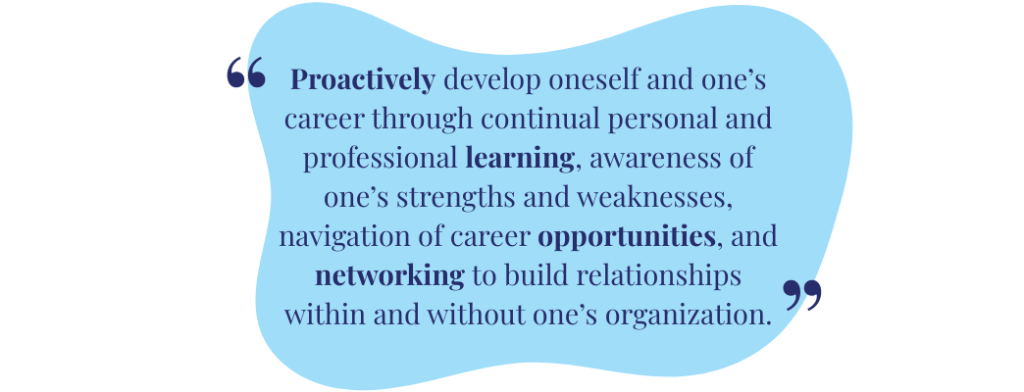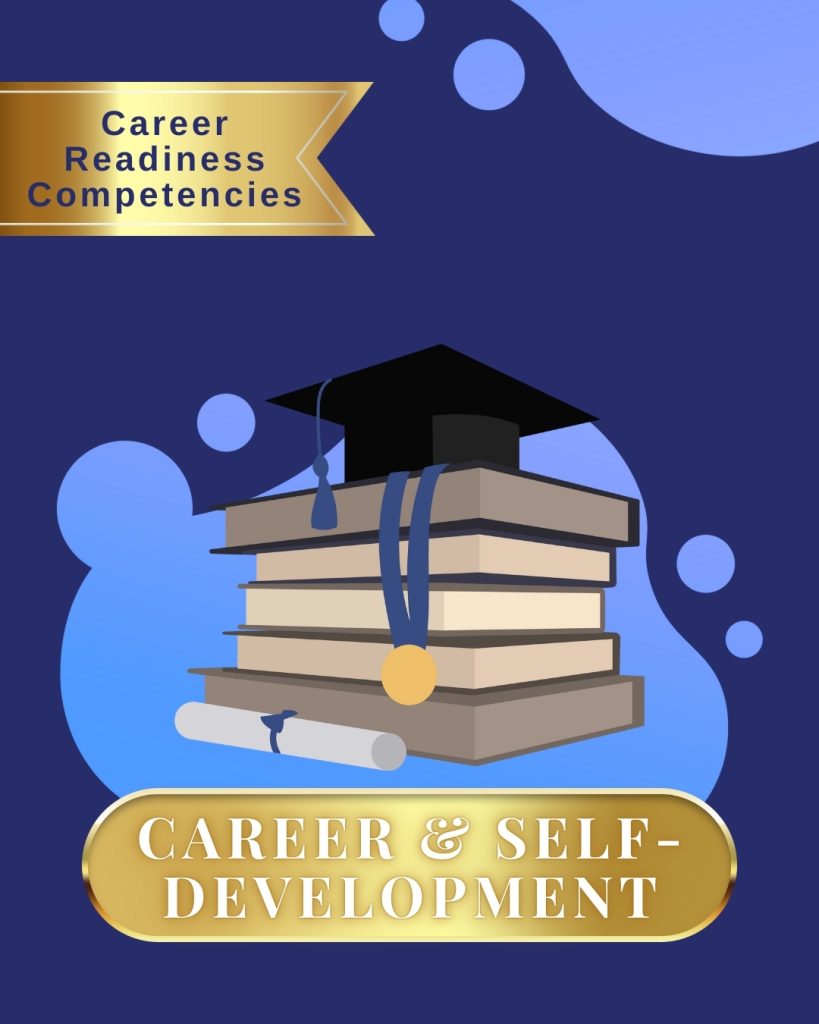In the first installment of our Career Readiness blog series, we’re diving into Career & Self-Development—a foundational competency for anyone preparing to thrive in a rapidly evolving workforce.
According to the National Association of Colleges and Employers (NACE), Career & Self-Development is defined as:

Let’s break this down with examples of how you can bring this competency to life.
Sample Behaviors and Real-World Applications
💪 Show an awareness of your strengths and areas for development
Start with honest self-reflection. Then ask professors, colleagues, or supervisors for feedback on what you do well and where you can grow. Try using online career assessment tools. There are many to choose from, but we’ve highlighted some free options in the Resources section below.
🌱 Identify areas for continual growth while pursuing and applying feedback
Receiving feedback is part of professional growth. Be sure to carefully read all feedback from your instructors and take advantage of it. Learn from the input you receive—then take action to improve.
💭 Develop plans and goals for your future career
Think ahead. Where do you see yourself in one year? Five? Try using the SMART goals framework (Specific, Measurable, Achievable, Relevant, Time-bound) to map out steps like completing a degree, applying for internships, or earning a certification in your field.
📢 Professionally advocate for yourself and others
Learn to speak up for your accomplishments and needs. If you want to take on a leadership role in a student organization, express your interest and share why you’re a good fit. Advocating also means supporting others—like recommending a colleague for an opportunity or sharing helpful resources.
🔎 Display curiosity; seek out opportunities to learn
Curiosity drives growth. Attend webinars, listen to industry-specific podcasts, or read professional blogs and journals. Seek and embrace development opportunities; look for micro-credential programs, continuing education workshops, or leadership conferences.
↗️ Assume duties or positions that will help you progress professionally
Volunteer for projects that stretch your skills. If you’re working a part-time job, offer to help with scheduling, social media, or training new hires. These experiences can translate into valuable resume material.
🤝 Establish, maintain, and leverage professional relationships
Networking isn’t just for job hunting. Conduct informational interviews with alumni or professionals in your field. Join online groups on platforms like LinkedIn to stay connected with your industry.
Where to Find Resources
- Career Assessment Tools:
- O*NET Interest Profiler – Developed by the US Department of Labor, this test helps you discover broad areas of work that align with your interests.
- CareerFitter – Offers a free test that assesses your work personality and provides career recommendations.
- Truity – Provides several free Career Interest and Personality tests that explore your personality and how it relates to different careers.
- The Princeton Review Career Quiz – Offers a simple, free quiz to explore possible career paths based on your style and interests. It’s a good option for a quick overview of potential career matches.
- A few more: The Keirsey Temperament Sorter helps identify your personality type and its implications for the workplace. Myers-Briggs Type Indicator (MBTI) is a well-known personality test with free versions available online. Career Explorer offers a comprehensive career assessment that considers interests, personality, abilities, and more.
- O*NET Interest Profiler – Developed by the US Department of Labor, this test helps you discover broad areas of work that align with your interests.
Consider what aspects of your career you want to explore (interests, personality, skills, etc.). Read reviews and compare different tests to see which best suits your needs. Don’t hesitate to try multiple tests to get a broader perspective on your career options.
- Explore Workforce Trends:
- O*NET Online – career data and projections
- Occupational Outlook Handbook – job outlook and industry trends from the US Bureau of Labor Statistics
- LinkedIn’s Workforce Insights – hiring and skill trends
- O*NET Online – career data and projections
- Find Industry Organizations:
- O*NET also has a Professional Associations Search that can be used to find organizations by job title
- Check your industry’s accrediting or licensing boards
- Ask professors or mentors which organizations they recommend
- O*NET also has a Professional Associations Search that can be used to find organizations by job title
- Attend Career Events and Webinars: Many professional organizations offer presentations and workshops to their members and to the public. Aspen conducts several regular webinar series hosted by Alumni & Career Services and Faculty Services departments designed to support your education, career, and self-development. Be sure to check the Alumni & Career Services page for upcoming virtual events!
Take the First Step
Career & Self-Development is ongoing—it doesn’t stop when you graduate. The good news is, every student and alum has the tools to grow, adapt, and thrive. By actively seeking growth and building your network, you’re laying the groundwork for lifelong success.
Ready to take your next step? Explore our programs and apply today. Higher education isn’t just about earning a degree—it’s about building your future, one competency at a time.
Jump to a deep-dive of each of the 8 Career Readiness Competencies:
Overview
Career & Self Development
Communication
Critical Thinking
Equity & Inclusion
Leadership
Professionalism
Teamwork
Technology

